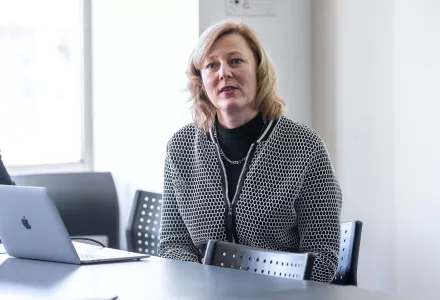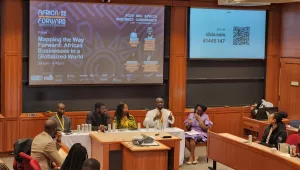
“Digitalization becomes an amplifier for existing social inequalities. Hence, the social fabric begins to fray and the possibility of an open digital society is put at risk. AI is even being used by China for its totalitarian regime. Guided by our transatlantic values, we need to design an agenda for an inclusive digital society.”
— Dr. Gesche Joost, Professor of Design Research at the Berlin University of the Arts
February 24th, 2020, in Cambridge, Massachusetts, Dr. Gesche Joost, Professor of Design Research at the Berlin University of the Arts and head of the Design Research Lab since 2005, discussed the digital divide and how it will shape social connectivity in an event moderated by Cathryn Clüver Ashbrook, Executive Director of the Future of Diplomacy Project and the Project on Europe and the Transatlantic Relationship, and Lauren Zabierek, Executive Director of the Cyber Project.
According to Dr. Joost, the geographical digital divide is defined by three levels: access, skills, and the ability to use digitalization for one’s own objectives.
“Do you have a computer? Do you know how to use and access the knowledge [on that computer]? If you have access and skills, could you use digitalization for your own objectives? The first and second questions are still very big issues everywhere around the world. Many had hope, [for instance], that Africa could benefit from the digital revolution in the world. Even though there is so much hardware available in Africa, there’s also growing inequality,” she said.
China has quite a different relationship with technology: “The government uses digitalization to control their people,” Joost said. “China has access to lots of data, so they have a competitive advantage in AI versus Europe. Available data feeds the social scoring system. These systems lead to more safety — Shanghai is one of the safest places in the world because they have great ways to track criminals using surveillance. They also tracked people with coronavirus using camera surveillance to forecast who might be of concern for the government. This creates a totally different social society, [and China has] plans for global leadership using data and AI.”
Joost argued that the EU and US must leverage their transatlantic relationship to lay the foundation for an open and inclusive digital world.
“We have to have a shared vision going forward to design an inclusive digital society. [First], every person has to have the right to free and equal access to communication and information services without having to waive any fundamental rights in exchange. [Second,] raising awareness for individual opportunities is important. We need to fold everyone into the broader story, [and] we can do this through participatory design, increasing data literacy, and improving digital education from the elementary school level onward.” Third, Joost said that data should be treated as a common good and that a framework for digital rights should be put in place.
“These are points that must become part of a shared vision between the US and Europe. As declared by the G7 on Digital Transformation, we have to ‘ensure in particular that the digital transition (…) serve the empowerment of individuals and foster their rights and freedoms.’”
Michalak, Winston Ellington. “The Impact of AI and Digitalization on Social Cohesion.” April 1, 2020







